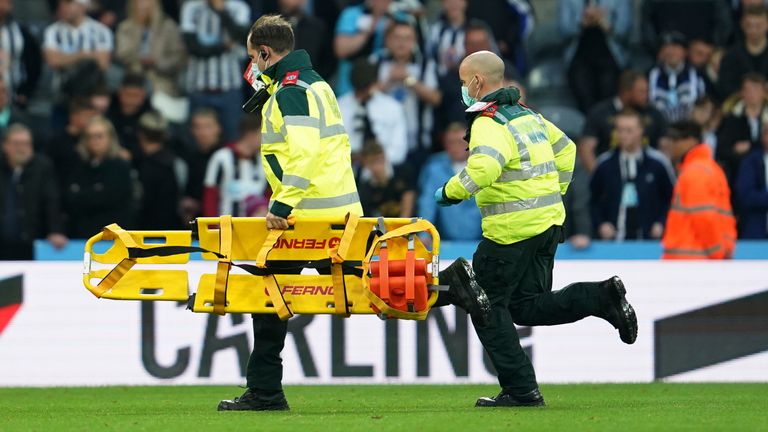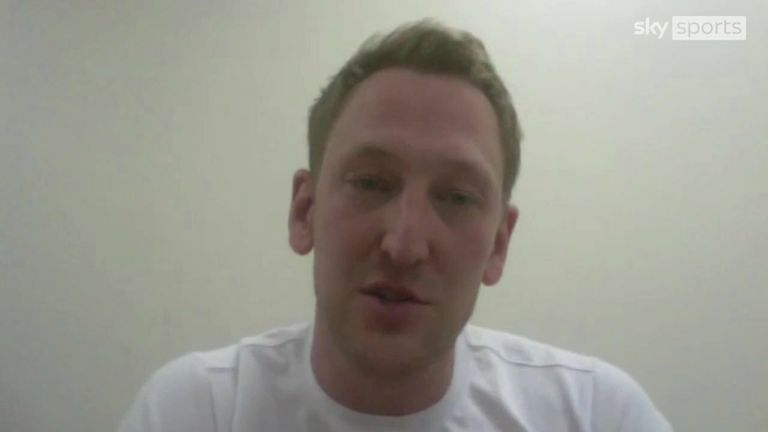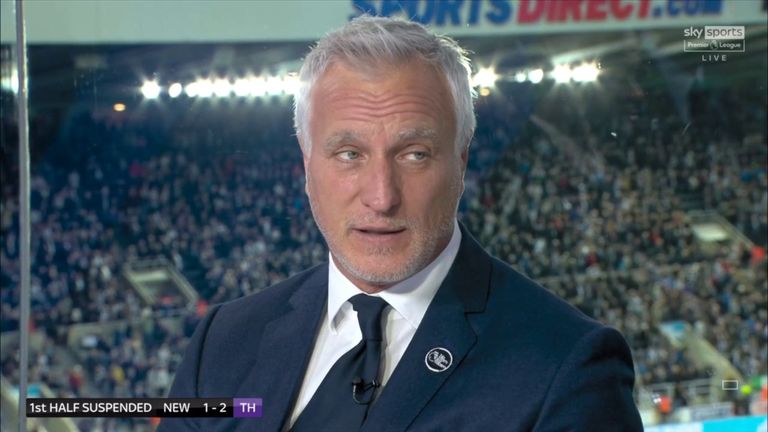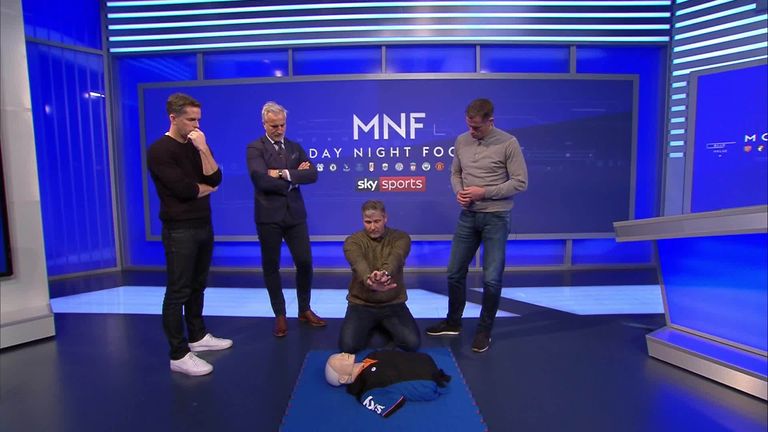Newcastle fan who collapsed during Premier League game against Tottenham 'making great progress'
Alan George Smith, 80, collapsed during the first half of the match at St. James' Park with play suspended in the 40th minute while his condition was stabilised; Dr Tom Prichard helped save the Newcastle fan in cardiac arrest and talked through the ordeal with Sky Sports News
Wednesday 20 October 2021 18:36, UK
The fan who required medical assistance during Newcastle United's Premier League match against Tottenham on Sunday "is making great progress", a family statement has said.
Alan George Smith, 80, collapsed during the first-half of the match at St. James' Park with play suspended in the 40th minute while his condition was stabilised.
Tottenham defender Eric Dier ran to the touchline and urged medical staff to attend with a defibrillator with both sets of players walking to the sidelines as emergency crews attended the person in the East Stand.
- Fan stable in hospital after medical emergency halts Newcastle vs Spurs
- How do you perform CPR?
- Newcastle 2-3 Tottenham - Match report and highlights
After being given CPR, Mr Smith was then transferred to the Royal Victoria Infirmary (RVI) in Newcastle city centre before being moved for specialist care at the Freeman Hospital.
A family statement, issued by Mr Smith's son, Paul read: "We are pleased to advise that Alan is making great progress, is now fully alert and is up and walking about.
"He will remain in hospital over the next few days while further tests are carried out.
"He and our family would like to say thank you to his friend, Don Williamson, who was with him at the time and alerted everyone to his condition.
"We would also like to thank and pay tribute to the doctors and nurses who administered CPR, the paramedics from North East Ambulance Service, St John's Ambulance, fans and stewards at the scene, as well the medical staff at the RVI and Freeman Hospital. We will be forever grateful."
"We would also like to say thank you to all of the people who have wished Alan well on social media and the players and staff of both Newcastle United and Tottenham Hotspur."
The game was subsequently restarted with Tottenham going on to win 3-2.
Newcastle fan doctor: Early action is the key
Doctor Tom Prichard, who helped save the Newcastle fan in cardiac arrest, talked through the ordeal with Sky Sports News on Monday.
He said: "I was in the Gallowgate stand behind the goal and I could see there was something going on with the fans in the East Stand. They were calling the St John's Ambulance crew over and I just kept my eye on things and thought I better go over to at least offer some help or advice.
"I made my way over and sure enough there was a gentleman in cardiac arrest, lying on six or seven chairs. St John's were fantastic, in such a stressful environment to quickly get the pads on like they did was superb.
"A member of the public had already started chest compressions, so I came in, took control of the compressions and carried on CPR while the ambulance crew set the defibrillator up.
"We administered a shock, which was quite difficult in a crowded place, I've never had that before. Lots of people around.
"We carried on some more CPR, another shock, and were able to get him back around again.
"The importance of early CPR and early defibrillation is what saved this man's life, it's what saved Christian Eriksen's life. Getting things done early is what matters, if St John's hadn't been there or he was at home by himself he wouldn't have survived.
"Trying to make the public aware of early CPR is really important. Hopefully we can get the public to understand it more."
Wolves players given CPR training
Wolves players were given basic life support training at the club's training ground on Wednesday, after members of the squad requested the session.
Club captain Conor Coady and winger Adama Traore were among those present as players practiced performing CPR on a dummy.
The club posted on Twitter: "At the request of our players, we held a basic life support training session at Compton this afternoon.
"You never know when these skills might be needed. Be prepared."
The session came just days after the incident at St James' Park, and almost a year since Wolves forward Raul Jimenez suffered a serious head injury during a match at Arsenal, which saw him require oxygen on the pitch before later undergoing surgery on a fractured skull.
Ginola recalls role CPR played in his recovery from cardiac arrest
Former Newcastle midfielder David Ginola had a quadruple heart bypass after suffering cardiac arrest during a charity match in France in 2016 and was a Sky Sports pundit at St James' Park on Sunday.
Ginola was given CPR on the pitch at the time and spoke of its importance in enabling someone of having a better chance of a full recovery.
"This is what saved my life - those were the words of the surgeons that operated on me," he said.
"The one who saved my life were the ones on the football pitch who knew how to perform CPR. They did it for 12 minutes and I was dead for 12 minutes. It is so important as otherwise the brain will be damaged.
"Sometimes [when doing CPR] people don't want to hurt you too much but you need to go deep and break ribs. When you learn how to do it, you are going very strong on the body. This is the key. It's vital."
What is CPR and how do you perform it?
CPR stands for cardiopulmonary resuscitation and is a medical technique that is given to someone who goes into cardiac arrest.
That occurs when the heart encounters an electrical issue and stops pumping blood around the body and to the brain, causing the person to fall out of consciousness and stop breathing.
Medics define this as 'clinical death', which is the onset of biological death, although CPR can help re-start the person's heart functions and save their life.
By administering chest compressions and rescue breaths, the CPR performer helps to pump blood and oxygen around the person's body, taking over the role of their heart and lungs.
Always seek professional help by calling 999 before starting CPR. The NHS's advice to carry out chest compressions is as follows:
- Place the heel of your hand on the breastbone at the centre of the person's chest. Place your other hand on top of your first hand and interlock your fingers.
- Position yourself with your shoulders above your hands.
- Using your body weight (not just your arms), press straight down by 5 to 6cm (2 to 2.5 inches) on their chest.
- Keeping your hands on their chest, release the compression and allow the chest to return to its original position.
- Repeat these compressions at a rate of 100 to 120 times a minute until an ambulance arrives or you become exhausted.
The British Heart Foundation recommends that in an emergency situation it is better to try and perform CPR, even if unsure, rather than to not do anything at all.







